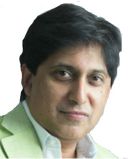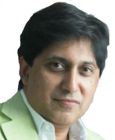Relationships
Lessons on Harnessing Unconditional Love: Assumptions About Peter Buffett’s Brain
What To Do With Unconditional Love: Peter Buffett's Wisdom Interpreted
Posted May 17, 2010
What do you imagine would be the most influential positive force in the son of a billionaire? And one of the richest billionaires in the world at that? While the privilege of financial support is undoubtedly a gift and a very positive one too, in a recent interview with Peter Buffett, I found out that the greatest gift that has captured his gratitude was the unconditional love from both of his parents-with a twist. We all hear of how important parental love is, and how vital it is to experience this unconditional gift. But Peter Buffett emphasized something that few stop to ponder, and that is, it is not just receiving this love that matters, it is also what you do with it. Receiving unconditional love is a gift that promises so much. But just as it is with wealth, managing that love and how you invest it makes all the difference.
In his book, "Life Is What You Make It" Peter Buffett tells his own investment success story-a story of the power of the love he received from both of his parents, and how this influenced him to follow his heart in the pursuit of fulfillment. While he makes no claims to having reached Nirvana, he describes the indelible impression that the love of his mother and father etched in his motivation to express and discover himself. In the interview with me, he explained that both of his parents always conveyed that he had something special and unique. And while they pointed to it, and shared it with him, they never took the position of telling him what to do. In the process, he was able to channel this love into a path of action. But what is unconditional love, and does it really make a difference?
A recent brain imaging study revealed that unconditional love specifically activated multiple brain regions some of which have been activated in maternal and romantic love in other studies [1]. Many of the activated regions were involved in the experience of reward, so that the person feeling unconditional love feels rewarded in a very specific way. The beauty of this is that our brains also have mirror neurons, which reflect the emotions of people who are around. When Peter Buffett's parents' brains lit up with the reward of loving their son, this also likely was mirrored in his own brain. We also know from other brain imaging studies that the brain's reward center, when activated, sets up the brain for action by increasing motivation [2]. And this is where most of us, even when we are being loved, fail to make the connection. As Peter Buffett explains: "It doesn't really matter where you start in life, it matters where you go."
In bridging the gap between unconditional love and motivation on the one hand and action on the other, what fails in so many of us, and what can we do about this?
(1) We let go of the memory: Often, when we move on in life, we let go of the past, even if it was filled with motivating factors like unconditional love. To really utilize this gift, we have to keep the memories online so that the cognitive maps can guide us [3]. Otherwise, the experience is diminished in our brains. Mr. Buffett certainly re-experiences this by writing his book. Often, reading a book like this can help bring back those memories for the reader.
(2) We observe the love rather than experiencing it: It is clear from the book, that Peter Buffett knew how to take in and metabolize that unconditional love. The main message here is that you have to make it your own. As Buffet says in his book: ""forge your own path in life."
(3) We let go of the love because it creates too much pressure: I can't tell you the number of times I have seen this. Children of very loving parents acknowledge their parents' love but challenge this too, refusing to rise to the challenge of unconditional love. When Buffett says: "silver spoons don't come free," I believe that this applies not just to money but to unconditional love as well. When somebody believes in you, you have to take up the challenge of rising to the occasion.
(4) We think we have to know the end point: You don't have to "know" all the steps and the eventual goal of your work. In fact, new discoveries in neuroscience tell us that actions can create new thoughts and understanding as well [4]. All you have to do is start the journey. Buffett refers to the mystery of vocation, and what he is referring to here is that we are likely to have much more enjoyable lives if we don't just think about "ending up" somewhere.
Thus, Buffet's brain likely chose to frame the unconditional love that he was given in a thought process of "discovery" rather than knowing. In so doing, mistakes were allowed, and the key to learning and living his fullest life was that it was his own. This is the message of his book and my message to you about unconditional love: it gives you the courage and confidence to find your own path to fulfillment, and reflecting on it re-ignites the warming light that can help guide you on your path through life.
References
1. Beauregard, M., et al., The neural basis of unconditional love. Psychiatry Res, 2009. 172(2): p. 93-8.
2. Bianchi-Demicheli, F., S.T. Grafton, and S. Ortigue, The power of love on the human brain. Soc Neurosci, 2006. 1(2): p. 90-103.
3. Gupta, A.S., et al., Hippocampal replay is not a simple function of experience. Neuron. 65(5): p. 695-705.
4. Grafton, S.T., Embodied cognition and the simulation of action to understand others. Ann N Y Acad Sci, 2009. 1156: p. 97-117
5. Buffett, P. Life is What You Make It: Find Your Own Path to Fulfillment. 2010. Harmony. 1st Ed.


